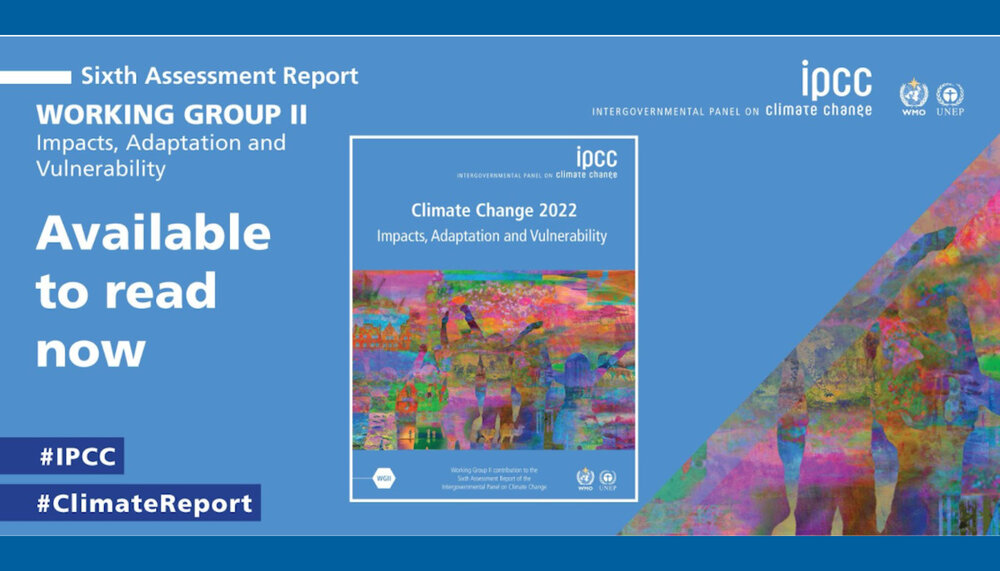GEO experts contribute to IPCC report on Impacts, Adaptation and Vulnerability

The GEO community made important contributions to the recent publication on impacts, adaptation and vulnerability by the Intergovernmental Panel on Climate Change (IPCC) as part of the Sixth Assessment Report (AR6), released on 28 February 2022 following a multilateral review of the Summary for Policymakers (SPM) between IPCC drafting authors and Panel members.
The IPCC Working Group II (WGII) assessment, Climate Change 2022: Impacts, Adaptation and Vulnerability, combines multiple sources of scientific evidence including impacts modelling based on climate projections, observations, and process understanding. The report assesses the disruptions caused by climate change that affect approximately 3.6 billion people living in climate hotspots around the world, including increases in the frequency and intensity of extremes that have adversely affected food and water security, hindering efforts to meet the Sustainable Development Goals (SDGs). The report underscores the urgency to act today and highlights how we can adapt to a changing climate, particularly by harnessing nature’s untapped potential, although progress on adaptation so far has been uneven. Ultimately, the report points out that we still have the ability to determine the future course of the Earth's climate, even if the window of opportunity is narrowing.
According to the WGII report, there is limited regional climate literacy and access to data and information, which pose additional constraints to planning and implementing adaptation measures. Building capacity and removing barriers to accessing climate finance are key to accelerating adaptation, as is monitoring and evaluation to track progress and enable effective adaptation.
Earth observations provide timely and high-resolution data on essential variables that can inform, support, and monitor adaptation measures from local to regional and global scales. Earth observations can also be used to strengthen information needed to access climate finance and fund adaptation projects. As a global intergovernmental partnership dedicated to advancing the use of Earth observation data to support climate action, GEO plays a central role in linking government institutions, research centres, and experts to address problems that transcend national boundaries and therefore cannot be solved by one country alone.
We would like to acknowledge the significant input of the GEO community to the global scientific evidence of the IPCC findings. WGII contributions to the 2022 report include the following GEO experts:
- Carolina Adler (Switzerland/Chile/Australia), Lead Author of Chapter 17: Decision making options for managing risk, Co-Lead Cross-Chapter Paper: Mountains; Lead Author of SPM and Technical Summary;
- Marie-Fanny Racault (UK/France), Lead Author of Chapter 3: Ocean and Coastal Ecosystems and their services, and four Cross-Chapter Boxes in Chapters 2, 5 and 7; Lead Author of SPM and Technical Summary;
- James Thornton (Switzerland/UK), Contributing Author Cross-Chapter Paper: Mountains.
Other GEO experts have been involved in IPCC assessments and special reports. Datasets and literature generated by GEO Work Programme activities have been used to inform IPCC findings over time.
These include numerous scientists from the Americas Group on Earth Observations (AmeriGEO), who have contributed to the Physical Science Basis report by WGI over multiple IPCC assessment cycles. Copernicus Climate Change Service (C3S) experts have also contributed to WGI reports, including the ERA5 dataset, a global atmospheric reanalysis of hourly meteorological conditions produced by the European Centre for Medium-Range Weather Forecasts (ECMWF) and C3S.
The GEO Global Network for Observations and Information in Mountain Environments (GEO Mountains) informed both the WGI and WGII assessments and, in particular, provided delineations of mountain regions and population densities for the Cross-Chapter Paper Mountains in WGII, as well as delineation of mountain regions for the 2019 Special Report on the Ocean and Cryosphere in a Changing Climate.
The Global Forest Observations Initiative (GFOI) contributed significantly to the 2019 Refinement of the 2006 IPCC Guidelines for the National Greenhouse Gas Inventories.
The Global Drought Information System (GDIS) provided input to the 2012 Special Report on Managing the Risks of Extreme Events and Disasters to Advance Climate Change Adaptation.
Other GEO activities, such as the Asia-Oceania Group on Earth Observations (AOGEO), Copernicus Atmosphere Monitoring Service (CAMS), Global Urban Observation and Information (GUOI), Climate Observation, Simulation and Impacts (CLIMATE-OBS), the Human Planet Initiative (HPI), have also participated in the IPCC assessment process to various extents.
The WGII Summary for Policymakers (SPM), as well as additional materials and information are available at https://www.ipcc.ch/report/ar6/wg2/.